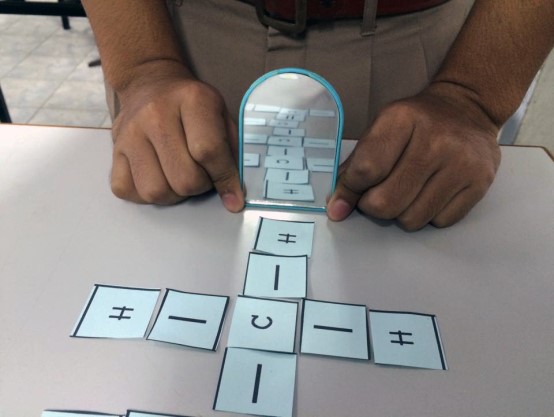การพัฒนาแนวคิดเรื่อง เคมีอินทรีย์ ของนักเรียนระดับชั้นมัธยมศึกษาปีที่ 5 โดยการจัดการเรียนรู้ที่ใช้แบบจำลองเป็นฐาน
Main Article Content
Abstract
Tanutta Khongton, Boonnak Sukhummek and Chatree Faikhamta
รับบทความ: 10 พฤศจิกายน 2558; ยอมรับตีพิมพ์: 30 มีนาคม 2559
บทคัดย่อ
การวิจัยนี้มีวัตถุประสงค์เพื่อศึกษาแนวทางการจัดการเรียนรู้โดยใช้แบบจำลองเป็นฐาน และพัฒนาแนวคิดของนักเรียน เรื่อง เคมีอินทรีย์ กลุ่มที่ศึกษา ได้แก่ นักเรียนชั้นมัธยมศึกษาปีที่ 5 จำนวน 39 คน ของโรงเรียนมัธยมศึกษาขนาดใหญ่พิเศษแห่งหนึ่ง สังกัดสำนักงานเขตพื้นที่การศึกษามัธยมศึกษา เขต 1 กรุงเทพมหานคร รูปแบบงานวิจัยเป็นการวิจัยปฏิบัติการในชั้นเรียน เก็บรวบรวมข้อมูลโดยใช้แบบทดสอบวัดแนวคิดเรื่อง เคมีอินทรีย์ แบบบันทึกหลังการจัดการเรียนรู้ของผู้วิจัย และอนุทินบันทึกการเรียนรู้ของนักเรียน ผู้วิจัยวิเคราะห์ข้อมูลด้วยการจัดกลุ่มแนวคิดของนักเรียนออกเป็น 5 กลุ่ม ผลการวิจัยพบว่า การจัดกิจกรรมการเรียนรู้โดยใช้แบบจำลองเป็นฐานโดยให้ความสำคัญกับการใช้คำถามที่ช่วยให้เกิดการอภิปรายแลกเปลี่ยนความคิดเห็นกัน ส่งเสริมให้นักเรียนลงมือปฏิบัติจริง มีปฏิสัมพันธ์กับเพื่อนในชั้นเรียน ใช้กระบวนการสร้าง แสดงออก ทดสอบ ประเมิน และขยายแบบจำลองที่สร้างขึ้น ประกอบกับการใช้สื่อการเรียนรู้ที่หลากหลาย ทำให้นักเรียนส่วนใหญ่ร้อยละ 45.8 สามารถพัฒนาแนวคิด เรื่อง เคมีอินทรีย์ ให้มีแนวคิดที่ถูกต้อง (SU) รองลงมาร้อยละ 29.5 มีแนวคิดถูกต้องบางส่วน (PU) ร้อยละ 15.8 มีแนวคิดถูกต้องบางส่วนและคลาดเคลื่อนบางส่วน (PU/SM) และร้อยละ 8.9 มีแนวคิดคลาดเคลื่อน (SM) โดยหัวข้อที่นักเรียนมีแนวคิดที่ถูกต้องมากที่สุด คือ สารประกอบไฮโดรคาร์บอน และหัวข้อที่มีแนวคิดคลาดเคลื่อนมากที่สุด คือ ไอโซเมอร์
คำสำคัญ: แนวคิดคลาดเคลื่อน การเรียนรู้ที่ใช้แบบจำลองเป็นฐาน เคมีอินทรีย์
Abstract
The research aimed to examine teaching practice of model-based learning activities and develop students’ conceptions in organic chemistry topic. The participants of this study were 39 grade-11 students in an extra-large high school under the Office of Bangkok Education Service Area 1. Action research was used as research methodology in which, an organic chemistry concept test and reflective journals made by the teacher’s and students’ were used as data collecting tools. The data were analyzed by categorizing students’ responses into 5 categories. The finding indicated that the model-based learning activities which emphasized on asking students questions for discussion and exchanging their ideas, encouraging them to do hands-on activities, interacting with their friends in class, engaging the process of producing, expressing, testing, evaluating, elaborating and extending their models and using various learning medias, could develop students’ correct organic chemistry conceptions. The model-based learning assisted 45.8% of students hold sound understanding (SU), 29.5% of them hold partial understanding (PU), 15.8% of them hold partial understanding with a specific misconception (PU/SM) and 8.9% of them hold specific misconception (SM). The concepts which students held highest sound understanding and specific misconception were the hydrocarbon compounds and isomers, respectively.
Keywords: Misconception, Model-based learning, Organic chemistry
Downloads
Article Details

This work is licensed under a Creative Commons Attribution-NonCommercial 4.0 International License.
References
Abraham, M. R., Grzybowki, E. B., and Renner, J. W. (1994). Understandings and misunderstandings of eight graders of five chemistry concepts found in textbooks. Journal of Research in Science Teaching 29(2): 105–120.
Chaiyen, Y. (2007). High school students’ conceptions and integrated science process skills about chemical equilibrium. Songklanakarin Journal of Social Science and Humanities. 13(4): 541–553. (in Thai)
Chantrawong, W. (2005). Hydrocarbon compound concepts of the first year nursing students at Christian University on the use of learning cycle model based on constructivism. Christian University of Thailand Journal. 11(1): 58–64. (in Thai)
Chiwaprecha, T. (1990). Problems of teaching elementary math in Nakhon Sawan province. IPST e-magazine. 72(1): 6–9. (in Thai)
Dachakupt, P. (2001). Child-Centered Learning: Concepts and Techniques 1. Bangkok: The Master Group Management. (in Thai)
Gilbert, J. K. (2005). Visualization in Science Education. Netherlands: Springer.
Gilbert, J. K., de Jong, O., Treagust, D. F. and van Driel, J. H., eds. (2002). Chemical Education: Toward Research–based Practice. Kluwer Academic Publishers.
Gobert, J. D., and Buckley, B. C. (2002). In-troduction to model-based teaching and learning in science education. International Journal of Science Education 22(9): 891–894.
Greca, I. M., and Moreira, M. A. (2000). Mental models, conceptual models and modeling. International Journal of Science Education 22(1): 1–11.
Gülten, S. Özge, Ö., and Melis, A. U. (2011). A study of determination of pre-service chemistry teachers’ understanding about acids and bases. Procedia Computer Science 3(1): 52–56.
Johnstone, A. H. (2000). Chemical education research: Where from here? Proceeding from Variety in Chemistry Teaching Meeting. UK: The Tertiary Education Group of the Royal Society of Chemistry in conjunction with the Education Research Group.
Justi, R., and Gilbert, J. K. (2002). Models and modeling in chemical education. In Gilbert, J. K, de Jong, O., Treagust, D. F. and van Driel, J. H. (Eds.). Chemical Education: Toward Research-Based Practice. Kluwer Academic Publishers.
Kuathan, N. (2010). The Secondary students’ mental models of chemical bonding. The 11th Graduate Research Conference Khon Kaen University (pp. 1176–1190). Khon Kaen: Khon Kaen University. (in Thai)
Musa, H. (2012). Grade–12 Students’ mental model in acid–base. 50th Kasetsart University Annual Conference (pp. 9–16). Bangkok: Kasetsart University (in Thai)
Norman, D. (1983). Some observations on mental models. In Gentner, D., and Stevens, A. (Eds.). Mental Models. Hillsdale, NJ: Lawrence Erlbaum.
Sirhan, G. (2007). Learning difficulties in chemistry: An overview. Journal of Turkish Science Education 4(2): 2–20.
Smith, J. P., diDessa, A. A. and Roschelle, J. (1993). Misconceptions reconceived: A constructivist analysis of knowledge in Transition. The Journal of the Learning Sciences 3(2): 115–163.
Tansiri, W. (2004). Thai Education in The Future: Concepts to Learning Reform According to Educational Act. Bangkok: Chulalongkorn University. (in Thai)
